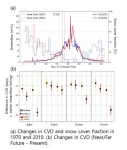Depression is more widespread among lesbian, gay, bisexual, transgender, or questioning (LGBTQ) youth than heterosexual, cisgender youth, making parental support more important for these adolescents. A new study released in Child Development by researchers at The University of Texas at Austin looks at parental social support and psychological control in relation to depressive symptoms for LGBTQ youth in the United States. Psychological control attempts to intrude into the psychological and emotional development of the child (e.g., thinking processes, self-expression, emotions, and attachment to parents). Although adolescence can be a sensitive period for stress exposure, it also provides opportunities to provide support that may prevent or help mental health symptoms, making parenting practices an important factor in the mental health of all adolescents. Previous research on LGBTQ youth and their parents has focused on acceptance and rejection specific to LGBTQ identity rather than general parenting practices that are known to shape adolescent development.
“Our research showed that those who felt greater social support from parents tended to have fewer depressive symptoms, whereas those who reported greater psychological control from parents had more depressive symptoms,” as explained by Amy McCurdy, postdoctoral scholar at The University of Texas at Austin. “For youth whose parents did not know their LGBTQ identities, having a combination of high psychological control and high social support from parents was linked with greater depressive symptoms.”
The current study analyzes data from the first two waves of a longitudinal study of sexual and gender minority youth which was designed to investigate risk factors for suicide. Data were collected at four consecutive periods, beginning in November 2011, each nine months following the preceding collection. Participants were recruited from community-based organizations and college groups located throughout three cities in the Northeast, West Coast and Southwest United States. Participants aged 15-21 years old who self-identified as LGBTQ were eligible. The sample included:
536 LGBTQ youth (252 men, 258 women, 26 identified as another gender). Just over 35% of participants identified as bisexual, 34% as gay, 20% as lesbian, 6.7% as questioning and 2.4% heterosexual/straight (and identified as transgender or gender diverse). Data were missing on 1.5% participants.
Twenty-five percent of participants reported their race as Black or African American, 24.4% as multiracial or another race, 22.6% as White or European American, 6.0% as Asian American or Pacific Islander, and this information was not reported by 21.8%, 37.1% of participants reported their ethnicity as Hispanic or Latino/a/x, whereas 53.9% reported their ethnicity as not Hispanic or Latino/a/x; 8.9% (n = 48) did not report this information.
The majority of youth were from the Northeast site (56.7%), 23.8% from the Southwest site, and 19.4% from the West Coast site.
The principal investigators received a federal certificate of confidentiality that allowed youth to participate without requiring parental consent, due to concerns that requiring parental approval would put some youth at risk of exposing their sexual orientation and/or gender identity. Youth under 18 years met with a youth advocate to receive more information about the study to ensure informed consent to participate. After the initial screening, eligible participants contacted site coordinators to confirm an appointment to complete a survey packet. Participants completed the survey packet at the selected study site, which took between 40 – 80 minutes to complete. Participants also received a cash incentive in exchange for their participation.
Researchers examined youth’s reports on the following:
Parental Social Support: Youth reported on and rated the frequency of parents’ specific support behaviors such as: “My parents show they are proud of me,” “My parents tell me I did a good job when I do something well,” and “My parents help me practice my activities.”
Parental Psychological Control: Youth responded to questions about their parent’s psychological control behaviors such as “My caregivers tell me that their ideas are correct and that I should not question them,” “My caregivers act cold and unfriendly if I do something they don’t like,” and “My caregivers won’t let me do things with them when I do something they don’t like.”
Parent Knowledge of LGBTQ Identity: Youth reported on mothers’ and father’s knowledge of their LGBTQ identity by answering the question “Do the people listed below know that you are LGBTQ?” for mothers (adoptive mother, foster mother, stepmother, etc.) and fathers (adoptive father, foster father, stepfather, etc.) and responding with “Definitely not,” “Probably not,” “Probably,” “Definitely.”
Depressive Symptoms: Participants were asked to rate the frequency of thoughts and feelings they experienced in the past 2 weeks. Example items include, “I have trouble doing things” and “I have trouble sleeping” with options ranging from “Never” to “Always.”
Covariates: Youth reported their sexual, gender, race, and ethnic identities, age, and whether they received free or reduced-price lunch at school.
The research shows that general parenting practices matter for the wellbeing of LGBTQ youth. The study also shows that psychological control is a particularly important predictor of youth depressive symptoms yet psychological control is seldom studied among LGBTQ youth. The findings also highlight the complexity of parenting experiences for LGBTQ youth, particularly those who may not be out to their parents. This research was inconsistent with a previous study conducted in Israel which found that the significant main effect of parental acceptance on youth depressive symptoms vanished when parental psychological control was entered into the model. Unlike a previous study conducted with LGBTQ youth in Israel, both parental support and psychological control simultaneously predicted youth depressive symptoms – the influence of one did not overpower the influence of the other.
“Research on parental acceptance and rejection has produced important initiatives that improve the well-being of sexual and gender minority youth,” said McCurdy. “Advancing understandings of the associations between parenting practices and youth well-being offers possibility for insights regarding risk and resilience mechanisms and ultimately support positive mental health outcomes for sexual and gender minority youth during adolescence.”
The authors acknowledge several limitations in their research including a reliance on self-reported data, generalizability of the sampling frame, and timeframe differences in key study measures. A deeper understanding of parenting practices is also needed in future research to inform efforts to identify and intervene in mechanisms of risk for sexual and gender minority youth.
###
This work was funded by the Eunice Kennedy Shriver National Institute of Child Health and Human Development at the National Institutes of Health.
Summarized from Child Development, Perceived parental social support and psychological control predict depressive symptoms for lesbian, gay, bisexual, transgender, queer, or questioning youth in the United States by McCurdy A.L. and Russell S.T. (The University of Texas at Austin). Copyright 2023 The Society for Research in Child Development, Inc. All rights reserved.
END


